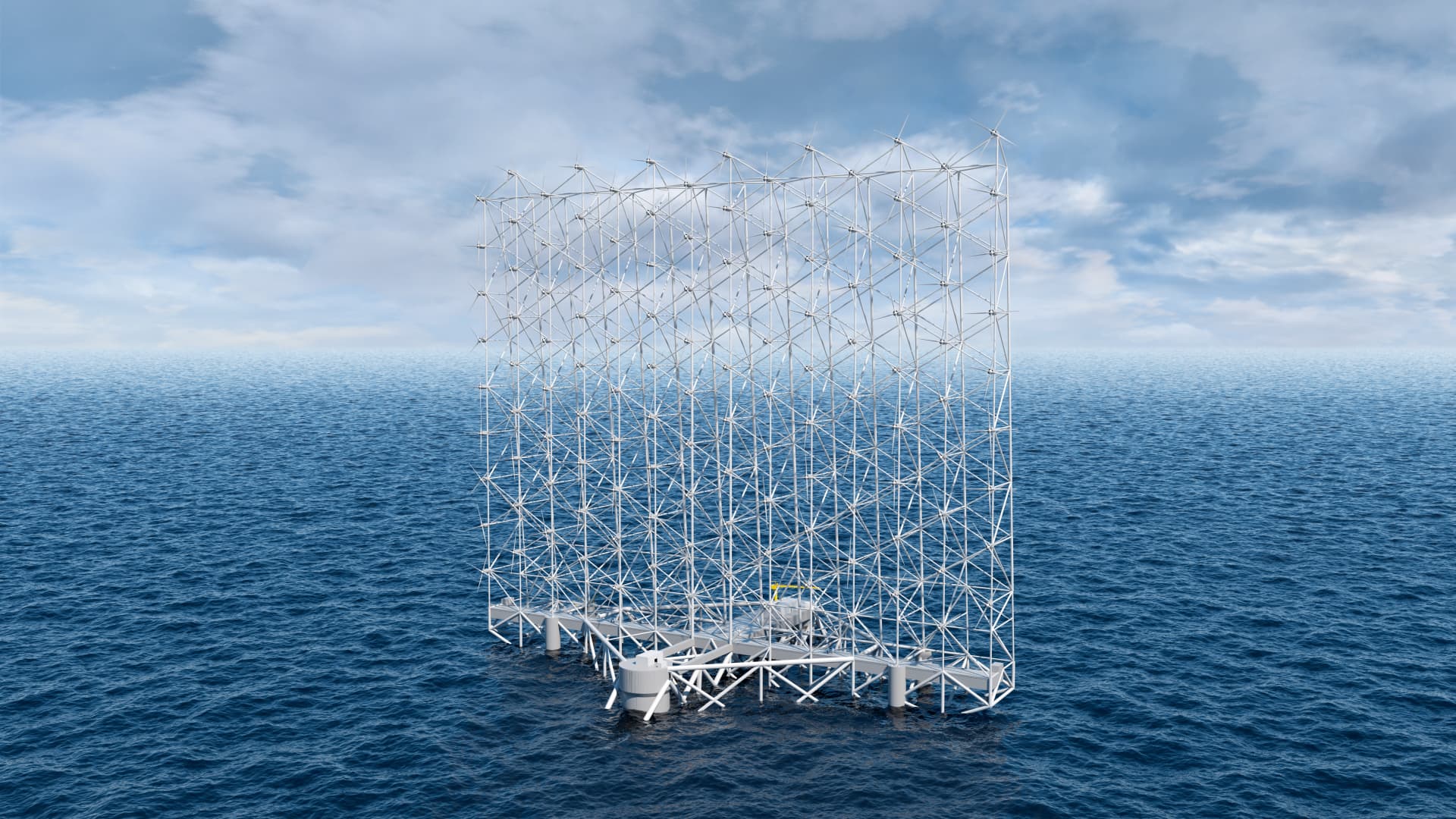Wind Catching Systems wants to develop a floating, multi-turbine system. This illustration shows what it could look like once deployed.
Wind Catching Systems
With their considerable height and sweeping blades, wind turbines are perhaps the most visually striking sign of the world’s shift to a more sustainable future.
Over the past few years, major players in the sector have developed huge new turbines, with the era of “super-sized” onshore and offshore structures appearing to be just round the corner.
While these massive pieces of kit are based on a familiar design that incorporates a tower, nacelle and blades, some firms are working on new ideas that, if built, would look very different indeed.
Wind Catching Systems is one of them. Established in 2017 and headquartered just outside the Norwegian capital of Oslo, it’s focused on the development of what it calls a “floating wind power plant based on a multi-turbine design.”
The overarching idea behind the Windcatcher system, as it’s known, relates to maximizing “power generation from a concentrated area.” The design also incorporates an elevator-based system for installing turbines and maintenance.
Illustrations of what the Windcatcher would look like are certainly striking, resembling a vast, water-based wall of rotating blades.
The potential scale of it is considerable. CEO Ole Heggheim said the “large model” would have a height of 300 meters (around 984 feet) and a width of 350 meters.
Such an iteration is some way off, however. While the large version of the Windcatcher would use 126 turbines of 1 megawatt, Heggheim said a planned pilot model will have “between seven and 12,” with the exact number to be decided over the next few months.
The plan is for a gradual scale-up. Following the pilot, Heggheim said his firm would “most likely build an intermediate size, probably around 40 megawatts, before we go for the large size.”
Floating tech
Floating offshore wind turbines are different from fixed-bottom offshore wind turbines, which are rooted to the seabed.
One advantage of floating turbines is that they can be installed in far deeper waters than fixed-bottom ones, and in recent years major economies like the U.S. have laid out goals to ramp up floating wind installations.
Firms like Wind Catching Systems are beginning to attract some notable backers as countries and companies around the world look to slash their emissions and hit net-zero goals.
In June 2022, the company said it entered into a strategic agreement with automotive giant General Motors and also secured investment from GM Ventures.
The agreement with GM, Wind Catching Systems said, related to “collaboration covering technology development, project execution, offshore wind policy, and the advancement of sustainable technology applications.”
More recently, in February 2023, the company announced it was awarded a pre-project grant of 9.3 million Norwegian krone (around $872,500) from Enova, which is owned by Norway’s Ministry of Climate and Environment.
Wind Catching Systems said the grant would “support the initial implementation of a full-scale Windcatcher.”
“Through the pre-project, Wind Catching Systems will mature and validate the technology and cost estimates for a full-scale Windcatcher,” it added.
Bird concerns
Over the past few years, the interaction between wind turbines and the natural world has generated a huge amount of discussion and debate, sometimes presenting hurdles to projects.
The effect on birds is a particular concern, with the U.K.-based Royal Society for the Protection of Birds warning that wind farms “can harm birds through disturbance, displacement, acting as barriers, habitat loss and collision.”
It adds that “impacts can arise from a single development and cumulatively multiple projects.”
During his interview with CNBC, Heggheim attempted to highlight how his company’s design might mitigate any risk.
“We have a large structure behind the turbines [and] we hope that that will be a visual for the birds,” he said, explaining that there was also the opportunity to incorporate detection and deterrence systems on the structure.
“We are hopeful that we can make something that is more benign, if you like, for birdlife,” he said.
A crowded field
Designs such as the Windcatcher offer a glimpse into how wind energy could develop, and a range of ideas have been proposed over the past few years.
These include Vortex Bladeless’ system, which has a cylindrical mast and does not use blades, and Kitemill, which has developed a design centered on a kite-like system tethered to the ground. Elsewhere, businesses like SeaTwirl are working on a vertical-axis floating turbine.
There is excitement about the potential of such proposals, but it seems a long road lies ahead when it comes to challenging the dominance of the onshore and offshore turbines of today.
“The role of new turbine models and innovation in turbine design should not be neglected,” Christoph Zipf, press manager at industry body WindEurope, told CNBC via email.
“It is good that the wind industry keeps exploring new paths and innovative solutions,” Zipf said. “But as things stand today the “traditional” wind turbine, the three-bladed, horizontal axis turbines will continue to lead the way.”
He added that such turbines are dominating all “competitive projects” in offshore, floating and onshore wind. “They offer the greatest electricity output at the lowest price.”
Disrupting the wind power industry is a colossal task that will require significant investment, time and patience.
Like other marine-based technologies, floating offshore wind faces a range of challenges, not least the incredibly harsh environment turbines need to operate in.
Wind Catching Systems’ Heggheim was, however, optimistic about the future. “We definitely want to be mainstream,” he said.
Whether the company’s plans bear fruit remains to be seen, but its journey over the next few months and years will be an interesting one to watch.


























































![Mason Ramsey – Twang [Official Music Video] Mason Ramsey – Twang [Official Music Video]](https://i.ytimg.com/vi/xwe8F_AhLY0/maxresdefault.jpg)





















